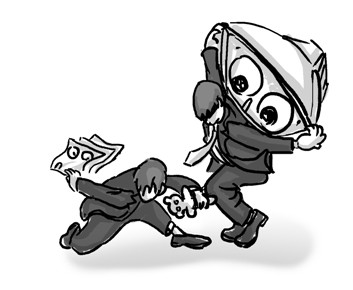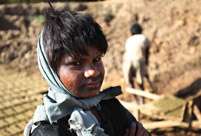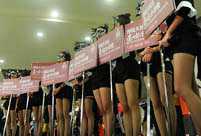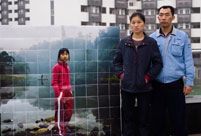 |
| Illustration: Lu Ting/GT |
Hongkou Gymnasium in Shanghai's Hongkou district was officially renamed Chin Woo Stadium this week and its neighboring Quyang Park will also be renamed Chin Woo Athletic Park in the near future, according to reports by people.com.cn.
Shanghai Chin Woo Athletic Federation has a blueprint to promote Chin Woo kung fu culture, which includes the establishment of an athletic park, a kung fu museum, a youth activity center, a road bearing its name, and a kung fu exercise. The federation expects to gradually create a Chin Woo cultural neighborhood in Hongkou district within five to 10 years.
The federation was founded by patriotic martial arts master Huo Yuanjia (1869-1910) in 1910 in Shanghai. Huo's legendary life has been immortalized on cinema and television screens by many directors and producers. Super stars Bruce Lee, Jet Li, Vincent Zhao and Donnie Yen have all tried to portray the legendary master.
Huo Yuanjia is regarded as a hero and his Chin Woo federation has attracted countless Chinese kung fu masters and fans.
Thanks to the movies, Chinese kung fu has impressed people the world over. My recent trip to four African countries proved this very well. During our interviews with local people in Egypt, South Africa, Mauritius and Kenya, when we asked them what they know about China, "Jackie Chan and kung fu" were the first and most commonly heard words.
It's not a surprise to learn that the local district government is supportive of the federation in the hope that the promotion of kung fu can one day make the location a tourist site.
It's not bad for the federation to have ambitious plans. It's commendable that the people involved are dedicated to promoting Chinese culture. But at the same time we have to think carefully about whether their dreams can come true. How practical is the plan?
According to media reports, the federation has begun to prepare an application to be designated a national intangible cultural heritage next year.
It is well-known that it takes considerable effort and money to complete a successful application. According to related regulations, there are detailed criteria and requirements for a culture to be granted the status of intangible cultural heritage.
According to UNESCO's official website, intangible cultural heritage is a new concept referring mainly to the spheres of popular and traditional culture, ethnological heritage and folklore. They are defined thus: "The practices, representations, expressions, knowledge and skills - as well as the instruments, objects, artifacts and cultural spaces associated there with - that communities, groups and in some cases individuals can recognize as part of their cultural heritage. This intangible cultural heritage, transmitted from generation to generation is constantly recreated by communities and groups in response to their environment, their interaction with nature and their history, and provides them with a sense of identity and continuity thus promoting respect for cultural diversity and human creativity."
But according to previous media reports, we have discovered that kung fu is in an awkward situation in the city. There are some associations and clubs sparing no effort in promoting the culture. But the majority of the participants are at quite an old age. Young people lack interest in Chinese martial arts, threatening its preservation from one generation to the next.
We have reason to worry that the promotion of Shanghai's Chin Woo kung fu may turn out to be in name only.
If kung fu is just an ancient concept without any modern incarnation, it's natural that one day it will fade out and disappear.
I also have to point out that Shanghai isn't an ideal location to apply for Chin Woo's intangible cultural heritage status. The fact that it's the site where the original federation began is not a sufficient reason. In the early 1900s, it was natural for Huo to choose Shanghai to challenge foreign warriors as the city had the most foreigners at that time. But it doesn't necessarily mean Shanghai is a place with strong kung fu roots.
Local Shanghainese can hardly be associated with kung fu. In public places, we sometimes witness quarrels between locals. Even if they resort to the most malicious of words, they seldom come to blows. It has always been said that Shanghainese men are not as macho as men in other regions; most of them won't solve problems with their fists, which is an example of Shanghai's civilized reputation. But as far as kung fu is concerned, Shanghai is not a good choice to promote Chinese martial arts.
I'm afraid the Hongkou government will disappoint foreign tourists who may travel a long way to find the kung fu holy site nothing like they imagined. There will be no masters, no magic, not even muscular locals.
I don't object to the revival of kung fu. As a Chinese, I sincerely hope that more Chinese traditions can be categorized as among the world's precious cultural heritages. But the right time, place and persons are the basic principles we have to find first.
 Low wages Indian migrant laborers
Low wages Indian migrant laborers Five fighters in flight training
Five fighters in flight training London mayor hails free trade, subway system on China tour
London mayor hails free trade, subway system on China tour Different eye catching shows at housing fairs in China
Different eye catching shows at housing fairs in China Special family portraits call attention to left-behind children
Special family portraits call attention to left-behind children Tibetan girl helps mobilize volunteers onlin
Tibetan girl helps mobilize volunteers onlin Lingerie show dazzles Wuhan Motor Show 2013
Lingerie show dazzles Wuhan Motor Show 2013  Running in fun customs at Beijing Int'l Marathon
Running in fun customs at Beijing Int'l Marathon  Weekly Sports Photos
Weekly Sports Photos Chinese riot police take Liberia peacekeeping mission
Chinese riot police take Liberia peacekeeping mission World has never been dark-- a blind kid’s life in Tibet
World has never been dark-- a blind kid’s life in Tibet Change to law may make it easier to sue polluters
Change to law may make it easier to sue polluters UNESCO world heritage site: Montale Tower
UNESCO world heritage site: Montale Tower U.S. Senate leader announces bipartisan deal
U.S. Senate leader announces bipartisan deal Chinese screen goddesses from Beijing Film Academy
Chinese screen goddesses from Beijing Film Academy Day|Week|Month